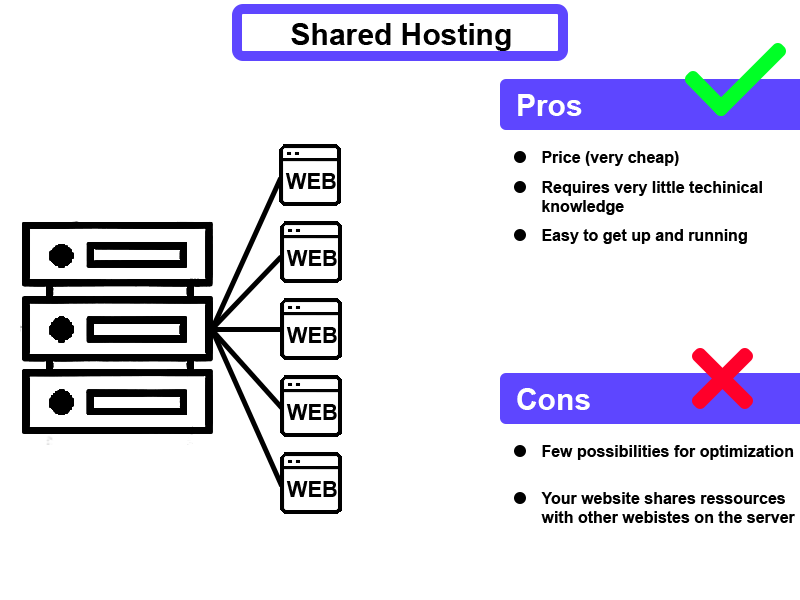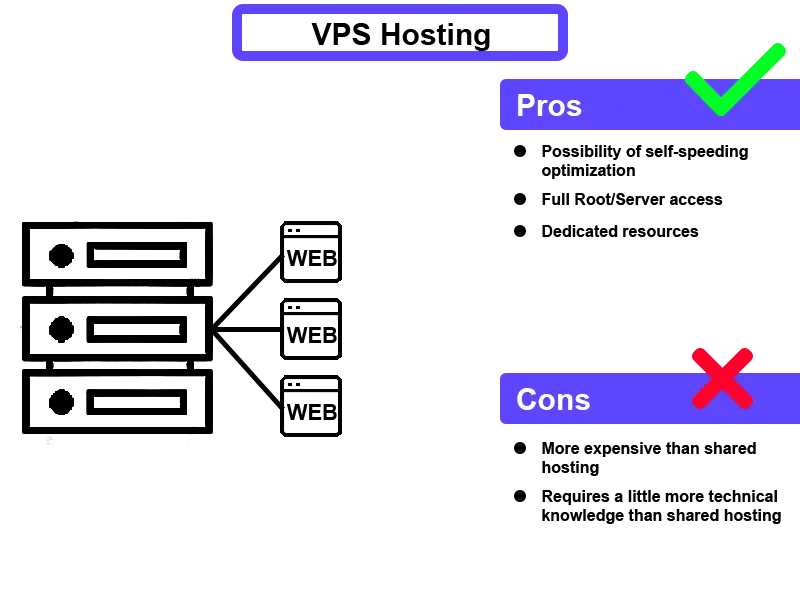The 4 Types of Web Hosting explained
09-06-2023 - BlogsThe 4 Types of Web Hosting explained
Navigating the vast terrain of the internet as a website owner can often be as daunting as exploring uncharted territories. With the digital landscape constantly expanding, the choice of setting up your online abode – your website – must be informed and strategic. A critical component of this virtual real estate is the foundation upon which your site stands: web hosting.
Just as every house needs the right kind of foundation to ensure its stability and suit its purpose, every website requires the appropriate web hosting to guarantee functionality, availability, and speed. Recognizing this, we delve into the different types of web hosting and their differences, aiming to provide a comprehensive guide that demystifies this pivotal choice. Whether you are a startup looking to make your first online splash or an established enterprise seeking to enhance your digital footprint, understanding the various types of web hosting is crucial. In this blog post we will not only explain the different types of web hosting available but also dissect the nuances that set them apart.
The different types of web hosting explained
Web hosting services allow individuals and companies to place their websites or web applications on the Internet – without having to buy/maintain a physical server themselves. When you create a website, it should preferably be accessible to other users on the web, and this is where web hosting services comes into the picture. It’s a bit like renting a small piece of land on the internet for your website. Think of it as buying a virtual plot of land and building your digital dream house. When you create a website, you can compare it a bit to opening a shop on the busiest street in the cyber city. You obviously want people to pass by, look in the window and say “wow, what a fabulous website”.
If we stick to the store scenario, then Web hosting is like renting a store room with the best visibility. You don’t want your shop in a creepy back room where only the rats can find their way, do you? No, you want to be in the middle of all the noise and action so people can’t help but notice you. Now imagine the web hosting provider as your digital caretaker. They look after your digital dream home and ensures that it is always open for business and that the virtual gutters are clean. You can enjoy hosting visitors and offering them the best experience and service on your site, while knowing that someone is taking care of all the technical details behind the “scenes”.
Shared Hosting
Shared web hosting is usually an economically favorable way to get your website online. With shared hosting, a web server is shared between several websites, which makes it possible to distribute resources equally between them. A well-established provider such as one.com has for many years been known for providing reliable web hosting services.
In the past, sharing a server could present challenges where a single website could risk taking all the resources and leaving the “neighboring websites” slower. But today they have servers where your website is located, with relatively high performance in most cases – so a website will never eat up all the server’s resources. Hosting companies today offer solutions that can effectively limit and balance consumption of resources to meet peak loads – so that all websites can run smoothly and harmoniously together. (#TeamSpirit)


VPS Web Hosting
VPS web hosting, also known as Virtual Private Server web hosting, which works in such a way that websites running on a managed VPS hosting share a physical server with other websites.
Try to imagine it a bit like living in a building with many apartments, but each tenant has their own space, so they don’t mix too much with each other, but still live at the same address. It is also worth noting that each VPS web hosting “tenant” is assigned their own partition with dedicated resources. On this type of host, there is often plenty of memory, storage space and processing power available, which of course reflects the price. The price of a VPS web hosting is generally more expensive than Shared Hosting.
Dedicated Server Hosting
Dedicated server hosting is a type of web hosting service where a single server is assigned to a single customer. It differs from shared hosting, where several customers share the same resources on a common server. This server is dedicated solely to the customer’s website(s) and applications, which means that all server resources such as memory, storage, processing power and bandwidth are exclusively available to that website. The customer has full control over the server and can customize it according to needs and wishes, including most often, operating system and other software configurations.
If we stick to previous examples with housing types, then you can say that Shared Hosting/VPS are apartments, where dedicated hosting is then a house, i.e. your very own property. You get an entire server just for yourself, so you can be sure that no one else is stealing your resources or messing with your code. It’s like having a private island in cyberspace where you are the king and can rule with an iron fist (or a cotton glove if you prefer).


Cloud Hosting
Cloud hosting is a form of webhosting where the resources to run a website or application are shared between several virtual servers that work together as a unified infrastructure. Unlike dedicated hosting, where a single physical server is reserved for a single customer, cloud hosting uses a network of virtual servers that are available across multiple physical locations.
With cloud hosting, you can think of it as having a flexible and scalable army of virtual servers working together to keep your online presence running smoothly. It’s like having a team effort where each server plays its part and contributes to the overall performance.
Today, cloud hosting has become a complex concept, and it is important to be aware when choosing a “cloud hosting” solution.
In the past, “cloud hosting” was used to describe a VPS configuration that could scale across multiple servers. If a web application experienced a sudden spike in traffic, the system could allocate extra resources and ensure smooth operation. The price and specifications of cloud hosting could vary significantly.
With cloud hosting, resources such as processing power, memory and storage space can be dynamically scaled according to customer needs in real-time. This means that if a traffic spike occurs, the hosting environment can automatically adapt and allocate extra resources to handle the load. Likewise, excess resources can be freed up when traffic drops, providing a more flexible and cost-effective solution. Cloud hosting also offers high availability and reliability as websites and applications are distributed across multiple servers. If one server fails, other servers take over, minimizing downtime and ensuring continuous operation. An advantage of cloud hosting is the possibility to pay according to consumption. The customer only pays for the resources they actually use, which makes it financially flexible and scalable for companies compared to traditional hosting models. But at the same time, it also requires a lot of knowledge in server setup, or it can very quickly end up wrong!
Within Cloud Hosting, there is a wide range of different providers, but the kings within cloud hosting are undoubtedly Amazon AWS, Microsoft Azure & Google Cloud
So what should you choose?
It is a question on which there is no immediate concrete conclusion, because there are a large number of factors that come into play. But a good rule of thumb is that the vast majority of “brand new” websites/webshops can basically manage with either shared hosting or VPS to start with – and then you can always move your hosting when (hopefully) the number of visitors to your site has grown so much so that it requires more resources. The important thing to remember is that hosting is a “fluid” thing, and you can always move your website to a new web host – without major problems.
Domain names, on the other hand, are not so fluid – and are often a bit difficult to just change once you have built a website around it. We have therefore created a blog post “What is a domain?” where we go in depth with domain names

